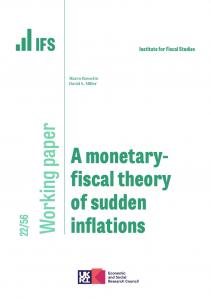It seems to be widely believed that the case for centralising revenue-raising is stronger than that for centralising expenditure decisions, so that federal governments should typically make transfers to lower level "state" governments. This paper argues, however, that pure efficiency considerations may plausibly point in exactly the opposite direction. This arises becauses of a "vertical" fiscal externality: the typical state may neglect the impact that its tax decisions have on the federal tax base. The optimal federal response is to internalise this distortion of state decisions by means of offsetting subsidy on the common tax base, the financing of which may plausibly require transfers from the states.
Authors

Research Associate University of Tokyo
Mick is a Ushioda Fellow at Tokyo College, University of Tokyo and a Research Associate at IFS.

Queen's University, Ontario
Working Paper details
- DOI
- 10.1920/wp.ifs.1996.9601
- Publisher
- IFS
Suggested citation
Boadway, R and Keen, M. (1996). Efficiency and the optimal direction of federal-state transfers. London: IFS. Available at: https://ifs.org.uk/publications/efficiency-and-optimal-direction-federal-state-transfers (accessed: 16 May 2024).
More from IFS
Understand this issue

Public investment: what you need to know
25 April 2024

The way Chancellors respond to economic news adds to our debt - here's why
1 March 2024

2p cut is welcome but fiscal risks are serious
23 November 2023
Policy analysis

Top-ups to the Scottish Budget for 2024–25 are likely – but huge uncertainty on their scale
22 February 2024

Outlook for the public finances
17 October 2023

No room for unfunded tax cuts or spending increases – this year or next
17 October 2023
Academic research

A monetary-fiscal theory of sudden inflations
20 December 2022

Rewriting the fiscal rules
12 October 2021

Spending Review 2021: plans, promises and predicaments
12 October 2021